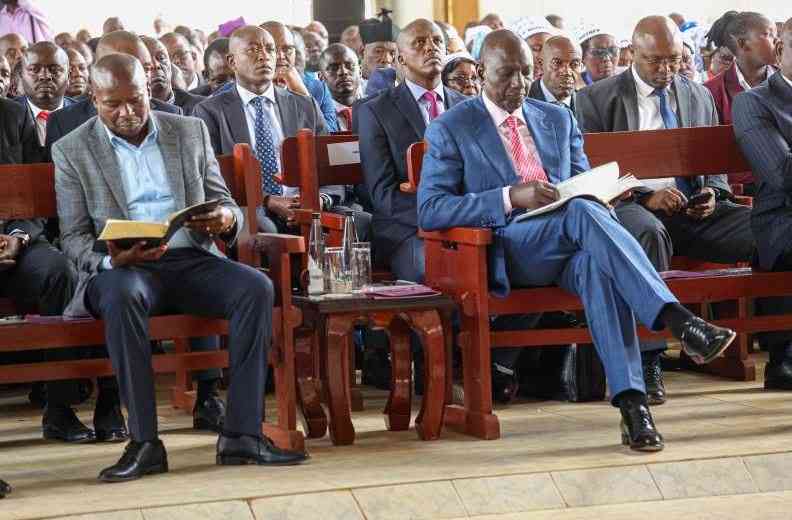
For all practical purposes, the government is in a position to meet the demands of the striking lecturers. No modern society can grow without giving maximum attention to the welfare of its teachers. From kindergarten to university, teachers shape the character, attitude, career pathways and worldview of learners.
Where should the government get the money to pay the striking lecturers? It is a no-brainer that billions of taxpayers' money are misappropriated by a few highly connected individuals. The scandals after scandals of corruption reported in the media for the last five years, for example, leave no doubt whatsoever that Kenya has the resources to justly remunerate its civil servants and even go further to provide incentives to make the competency-based curriculum to generate the kind of workforce it is meant to produce.
Let us work with very conservative figures. With a budget of Sh1 billion, the government could finance the annual salaries of approximately 416 lecturers if each is paid Sh2.4 million per year (or Sh200,000 monthly). Moreover, if the government succeeded in recovering and reallocating Sh50 billion annually from funds lost to corruption, it could support the salaries of 20,833 lecturers each year. This could revolutionise Kenya’s educational landscape by ensuring that higher learning institutions are well-staffed, capable of maintaining lower student-to-teacher ratios, and attractive to top educational talent.
With a consistent allocation of substantial resources to lecturers' salaries, numerous incentives emerge that could significantly enhance morale, productivity, and retention among these educators. Competitive salaries not only provide financial stability but also recognise lecturers’ expertise and contributions, making the profession more attractive and respected.
Additionally, with adequate funding, institutions can offer performance-based bonuses, support for further academic qualifications, and research grants that encourage scholarly advancement and innovation. Such resources can also allow for improved working conditions, including smaller class sizes, access to modern teaching technologies, and opportunities for professional development and international collaboration. These incentives foster a supportive academic environment where lecturers feel valued and empowered, motivating them to deliver high-quality education and mentoring to students.
The government should not appear helpless in the face of the lecturers' strike. It has what it takes to recover the billions siphoned out of its revenue streams every month. Not only do the Auditor General and the Control of Budget's reports reveal how the government is losing billions of shillings but the kind of swagger people in and out of government minting taxpayer's hard-earned monies display generates negative attitudes towards any sympathy Kenyans could have towards a financially-struggling government.
Besides, the government promises austerity measures that it does not commit to in practice. For instance, there are many public meetings and rallies whose cost-effectiveness is hard to explain. Lecturers are highly educated. They see and calculate the cost of running many of these meetings reported in the media, including many whirlwind worship tourisms over the weekend.
It is very difficult to sweet-talk lecturers forever. They too have aspirations in life to fulfill. To onboard them into the government’s challenges in raising the kind of remuneration they are after, the government must lead by example. Stop corruption, implement austerity measures and then bargain for a settlement.
Kenya does not lack resources to pay lecturers, teachers, nurses and doctors, among others. It lacks the political will to put breaks on mega corruption. Let us demand the sealing of the financial leakages in government. Let us also demand accountability of financial allocations to programmes and services. Kenyans cannot continue to pay taxes for low pay and poor service delivery. The striking lecturers are not making unreasonable demands.
We all want to support the government in discharging its mandate. But it has to show that it is not generating negative energy in the citizens while expecting support. It must lead in showing that it has the goodwill to right wrongs done in the past beginning with stopping corruption to raise funds to pay its workforce.
Dr Mokua is the executive director of Loyola Centre for Media and Communication
 The Standard Group Plc is a
multi-media organization with investments in media platforms spanning newspaper
print operations, television, radio broadcasting, digital and online services. The
Standard Group is recognized as a leading multi-media house in Kenya with a key
influence in matters of national and international interest.
The Standard Group Plc is a
multi-media organization with investments in media platforms spanning newspaper
print operations, television, radio broadcasting, digital and online services. The
Standard Group is recognized as a leading multi-media house in Kenya with a key
influence in matters of national and international interest.
 The Standard Group Plc is a
multi-media organization with investments in media platforms spanning newspaper
print operations, television, radio broadcasting, digital and online services. The
Standard Group is recognized as a leading multi-media house in Kenya with a key
influence in matters of national and international interest.
The Standard Group Plc is a
multi-media organization with investments in media platforms spanning newspaper
print operations, television, radio broadcasting, digital and online services. The
Standard Group is recognized as a leading multi-media house in Kenya with a key
influence in matters of national and international interest.








